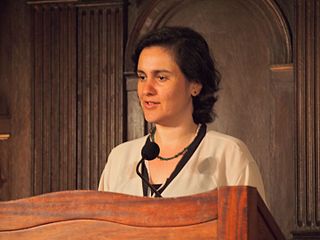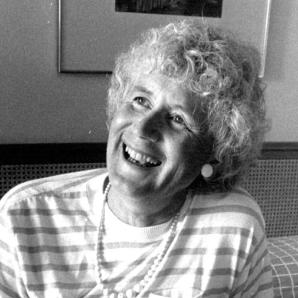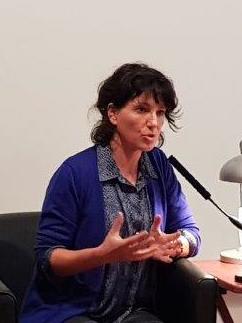
Ursula Kroeber Le Guin was an American author best known for her works of speculative fiction, including science fiction works set in her Hainish universe, and the Earthsea fantasy series. She was first published in 1959, and her literary career spanned nearly sixty years, producing more than twenty novels and over a hundred short stories, in addition to poetry, literary criticism, translations, and children's books. Frequently described as an author of science fiction, Le Guin has also been called a "major voice in American Letters". Le Guin said she would prefer to be known as an "American novelist".

The Dispossessed is a 1974 anarchist utopian science fiction novel by American writer Ursula K. Le Guin, one of her seven Hainish Cycle novels. It is one of a small number of books to win all three Hugo, Locus and Nebula Awards for Best Novel. It achieved a degree of literary recognition unusual for science fiction due to its exploration of themes such as anarchism and revolutionary societies, capitalism, utopia, and individualism and collectivism.

Maurice Gough Gee is a New Zealand novelist. He is one of New Zealand's most distinguished and prolific authors, having written over thirty novels for adults and children, and has won numerous awards both in New Zealand and overseas, including multiple top prizes at the New Zealand Book Awards, the James Tait Black Memorial Prize in the UK, the Katherine Mansfield Menton Fellowship, the Robert Burns Fellowship and a Prime Minister's Award for Literary Achievement. In 2003 he was recognised as one of New Zealand's greatest living artists across all disciplines by the Arts Foundation of New Zealand, which presented him with an Icon Award.

Always Coming Home is a 1985 science fiction novel by American writer Ursula K. Le Guin. It is in parts narrative, pseudo-textbook and pseudo-anthropologist's record. It describes the life and society of the Kesh people, a cultural group who live in the distant future long after modern society has collapsed. It is presented by Pandora, who seems to be an anthropologist or ethnographer from the readers' contemporary culture, or a culture very close to it. Pandora describes the book as a protest against contemporary civilization, which the Kesh call "the Sickness of Man".

Catherine Chidgey is a New Zealand novelist, short-story writer and university lecturer. Her honours include the inaugural Prize in Modern Letters; the Katherine Mansfield Fellowship to Menton, France; Best First Book at both the New Zealand Book Awards and the Commonwealth Writers' Prize ; the Acorn Foundation Fiction Prize at the Ockham New Zealand Book Awards; and the Janet Frame Fiction Prize.

Kamila Shamsie FRSL is a Pakistani and British writer and novelist who is best known for her award-winning novel Home Fire (2017). Named on Granta magazine's list of 20 best young British writers, Shamsie has been described by The New Indian Express as "a novelist to reckon with and to look forward to." She also writes for publications including The Guardian, New Statesman, Index on Censorship and Prospect, and broadcasts on radio.
Anita Desai, born Anita Mazumdar is an Indian novelist and the Emerita John E. Burchard Professor of Humanities at the Massachusetts Institute of Technology. As a writer she has been shortlisted for the Booker Prize three times. She received a Sahitya Akademi Award in 1978 for her novel Fire on the Mountain, from the Sahitya Akademi, India's National Academy of Letters. She won the British Guardian Prize for The Village by the Sea. The Peacock, Voices in the City, Fire on the Mountain and an anthology of short stories, Games at Twilight. She is on the advisory board of the Lalit Kala Akademi and a Fellow of the Royal Society of Literature, London.
Timothy Peter Mo is a British Asian novelist. Born to a British mother and a Hong Kong father, Mo lived in Hong Kong until the age of 10, when he moved to Britain. Educated at Mill Hill School and St John's College, Oxford, Mo worked as a journalist before becoming a novelist.

(Catharine) Jan Morris was a Welsh historian, author and travel writer. She was known particularly for the Pax Britannica trilogy (1968–1978), a history of the British Empire, and for portraits of cities, including Oxford, Venice, Trieste, Hong Kong and New York City. She published under her birth name, James, until 1972, when she had gender reassignment surgery after transitioning from male to female.
Robert Macfarlane is a British writer and Fellow of Emmanuel College, Cambridge.

Madeleine Thien is a Canadian short story writer and novelist. The Oxford Handbook of Canadian Literature has considered her work as reflecting the increasingly trans-cultural nature of Canadian literature, exploring art, expression and politics inside Cambodia and China, as well as within diasporic East Asian communities. Thien's critically acclaimed novel, Do Not Say We Have Nothing, won the 2016 Governor General's Award for English-language fiction, the Scotiabank Giller Prize, and the Edward Stanford Travel Writing Awards for Fiction. It was shortlisted for the 2016 Man Booker Prize, the 2017 Baileys Women's Prize for Fiction, and the 2017 Rathbones Folio Prize. Her books have been translated into more than 25 languages.

Lavinia Elaine Greenlaw is an English poet, novelist and non-fiction writer. She won the Prix du Premier Roman with her first novel and her poetry has been shortlisted for awards that include the T. S. Eliot Prize, Forward Prize and Whitbread Poetry Prize. Her 2014 Costa Poetry Award was for A Double Sorrow: A Version of Troilus and Criseyde. Greenlaw currently holds the post of Professor of Creative Writing (Poetry) at Royal Holloway, University of London.
Jane Harris is a British writer of fiction and screenplays. Her novels have been published in over 20 territories worldwide and translated into many different languages. Her most recent work is the novel Sugar Money which has been shortlisted for several literary prizes.

Kapka Kassabova is a poet and writer of fiction and narrative non-fiction. Her mother tongue is Bulgarian, but she writes in English.
Jamie McKendrick is a British poet and translator.

The Left Hand of Darkness is a science fiction novel by U.S. writer Ursula K. Le Guin. Published in 1969, it became immensely popular, and established Le Guin's status as a major author of science fiction. The novel is set in the fictional Hainish universe as part of the Hainish Cycle, a series of novels and short stories by Le Guin, which she introduced in the 1964 short story "The Dowry of Angyar". It was fourth in sequence of writing among the Hainish novels, preceded by City of Illusions, and followed by The Word for World Is Forest.
Mary Morris is an American author and a professor at Sarah Lawrence College. Morris published her first book, a collection of short stories, entitled Vanishing Animals & Other Stories, in 1979 at the age of thirty-two and was awarded the Rome Prize in Literature by the American Academy and Institute of Arts and Letters. She has gone on to publish numerous collections of short stories, novels, and travel memoirs. She has also edited with her husband, the author Larry O'Connor, an anthology of women's travel literature, entitled Maiden Voyages, subsequently published as The Virago Book of Women Travellers. Her recent novel The Jazz Palace has been awarded the 2016 Anisfield-Wolf Award in fiction. This award goes to work that addresses issues of cultural diversity and racism in America.
"The Dowry of Angyar" is a science fiction short story by American writer Ursula K. Le Guin, first published in 1964. It is the first work of the Hainish Cycle. The story is set on a fictional planet of the star Fomalhaut, and follows a highborn woman as she tries to track down a family heirloom. It was framed by commentary from ethnologists studying the intelligent life-forms of the Fomalhaut system. The story drew from Norse mythology, and explored the concept of time dilation. "The Dowry of Angyar" drew comments for its stylistic devices, while a review praised Le Guin's writing as "crystalline prose". It was later used as the prologue to Le Guin's 1966 novel Rocannon's World. In later publications, the story was given the title "Semley's Necklace".
This is a list of the literary works by British writer and historian Jan Morris (1926–2020).
The Ursula K. Le Guin Prize, established in 2022, is an annual, English-language literary award presented in honor of Ursula K. Le Guin. The $25,000 prize is awarded to an author for a single work of "imaginative fiction". The award is meant to honor authors who "can imagine real grounds for hope and see alternatives to how we live now".











